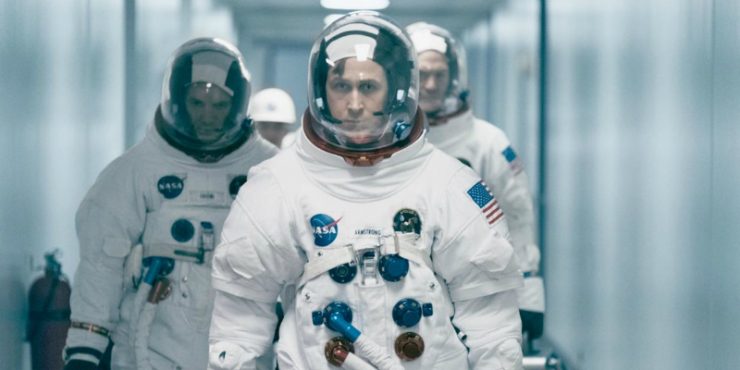Neil Armstrong is a name so ingrained into American history that it distracts from the fact that he willingly avoided any opportunity to show an ounce of personality or charisma. He was an incredibly private, results-oriented man obsessed with meticulous detail who poured the entirety of his feelings into his career as an astronaut. At least, this is the Armstrong that director Damien Chazelle presents in First Man, and I haven’t heard any source claim that it’s inaccurate. The film is an interesting case study into just how important historical immortality plays into drama. Neil Armstrong’s most famous act – walking on the surface of the moon – is far more dramatic than Armstrong as a man, a tight-lipped, unsentimental engineer who gives little credence to the imposing dangers of his profession. So does his monumental place in history override the fact that he is not much of a movie character?
The focus on Armstrong makes more sense when we understand what interests Chazelle as a storyteller. His last two films, Whiplash and La La Land, are filled with narratives that preach sacrifice for professional and artistic success, whether it mean giving up love, friendship, or, in the case of Whiplash, general sanity. Armstrong (played here with a kind of mannered stoicism by Ryan Gosling) embodies a lot of what Chazelle admires in that mythology. His insane dedication to perfection alienates his wife, Janet (Claire Foy), his two sons and even occasionally his fellow astronauts. Armstrong can’t imagine doing his job any other way, considering the risks being taken with his life each and every time he straps on the space suit. It would be malfeasance if he were any less committed.
The film’s script – by Oscar-winner Josh Singer – is surprisingly dexterous, roaming freely between Armstrong’s NASA duties and the changing world around him. It’s focus on the Gemini and Apollo missions is steady, but Singer and Chazelle paint the corners of the film with images of the Turbulent 60’s, as well as a Janet’s unenviable task of raising two raucous boys by herself (and having very little help when their father is home). The script has little recourse but to inflate everyone around Armstrong, since his character – as well as Gosling’s performance of him – never sees reason for inflation of his own. There is one very important detail in Armstrong’s life: the death of his daugther Karen as a toddler. Their second child – and only girl – her death early in the film adds complexity to Armstrong’s actions and decisions, his singular focus on success to avoid the realities of his immense grief.
Ryan Gosling is doing solid work here, but like Bradley Cooper in A Star is Born, we have a truly talented actor worried more about the details of a performance than the performance itself. The sharp intensity of Armstrong leads Gosling into some of his more irritating habits, receding into a vacuous, inexpressive state, and leaving the audience with little more to do but project our national pride onto him, in absence of his own. The role of grief in Armstrong’s life is laid on pretty thick in First Man, but the connection between his daughter and his mission is difficult to make, considering what Chazelle allows Gosling to show us. Moreover, I find it disheartening any time someone as abundantly charming as Gosling is forced to subdue his personality in the name of “serious acting”. It feels like a waste of his (and my) time. As for Claire Foy, I feel confident in saying that, even as her Hollywood film career is just beginning, she is quite overqualified for this part, which she does wonders with.
But of course, this is the story that Chazelle wants to tell. He has little interest in counting American flags in the name of national exceptionalism. Armstrong is one of the proudest symbols of American iconography, a testament to progress and professionalism; living proof that American ingenuity far exceeds any other nation. That Chazelle eschews all of that nonsense to try to get to the bottom of Armstrong as a man is an admirable and ambitious artistic effort. Gone is the slickness of Whiplash or the pomp and pageantry of La La Land. With cinematographer Linus Sandgren, Chazelle is having a lot of fun in playing with where a camera can go. Shooting a lot of handheld set pieces and using uncentered close-ups, Chazelle creates a lot of unrest in domestic scenes, while imbuing the space travel sequences with vast, stunning imagery. Chazelle, at 33, continues to get better as a filmmaker. He is always impressive; a sharp, instinctual mind for where to place the camera.
I’m not sure that First Man lives up to the promise of Whiplash or the grandeur of La La Land. Those two films were wunderkind-type stuff, while First Man was touted to be the mature establishment picture. The attention to detail in the filmmaking is unmatched, but Chazelle is still working within the confines of the biopic genre, and Neil Armstrong is not as close to Charles Foster Kane as Chazelle and the script think he is. I’ll give credit to First Man for avoiding MAGA-level American pump-up rhetoric, but it is still a story entangled in the life of a Great Man, whose absenteeism as a husband and father is pushed as the price of doing business. This is material we’ve all seen before, and the most we could ask for if we’re hearing this story once again, is to give us someone worth watching.
Directed by Damien Chazelle










